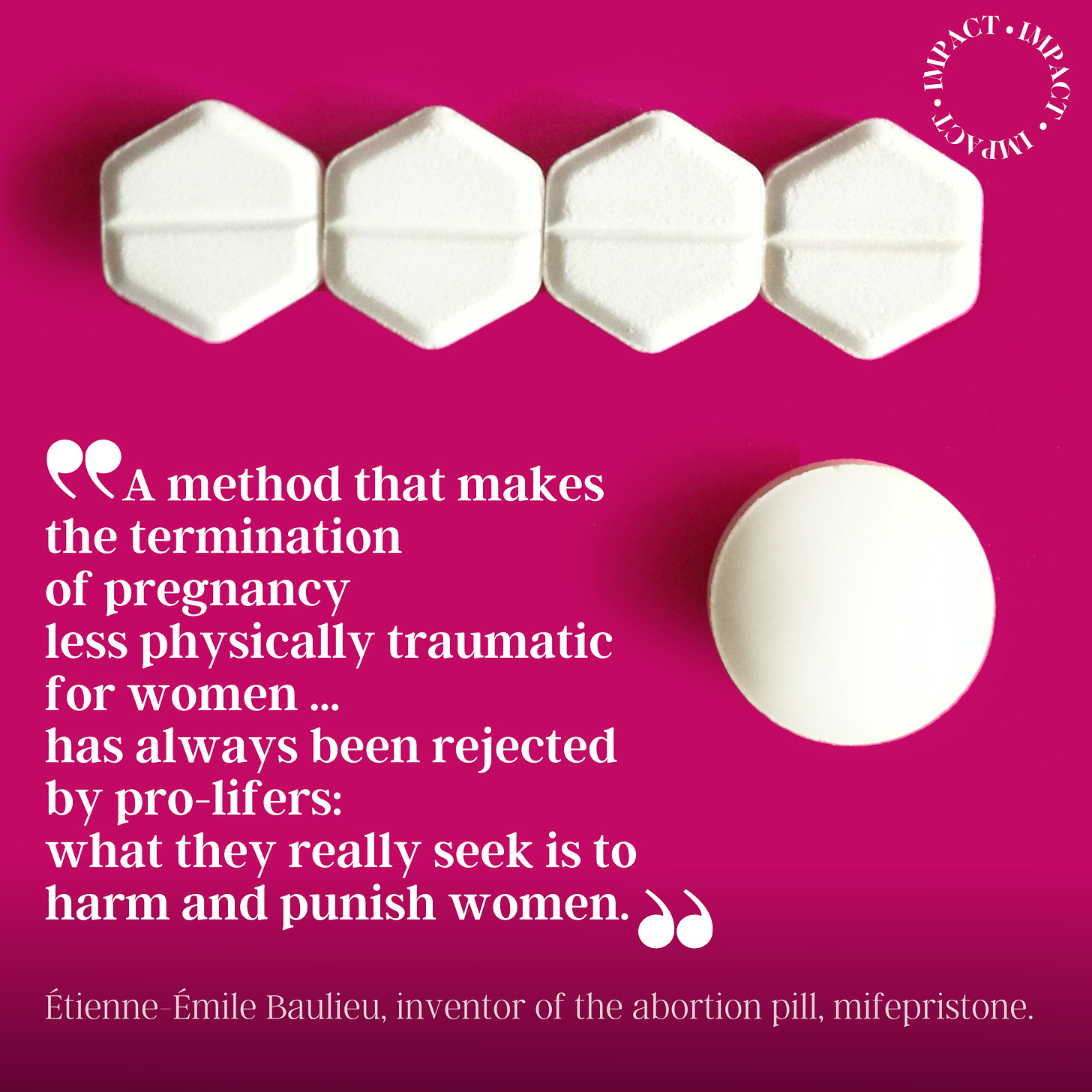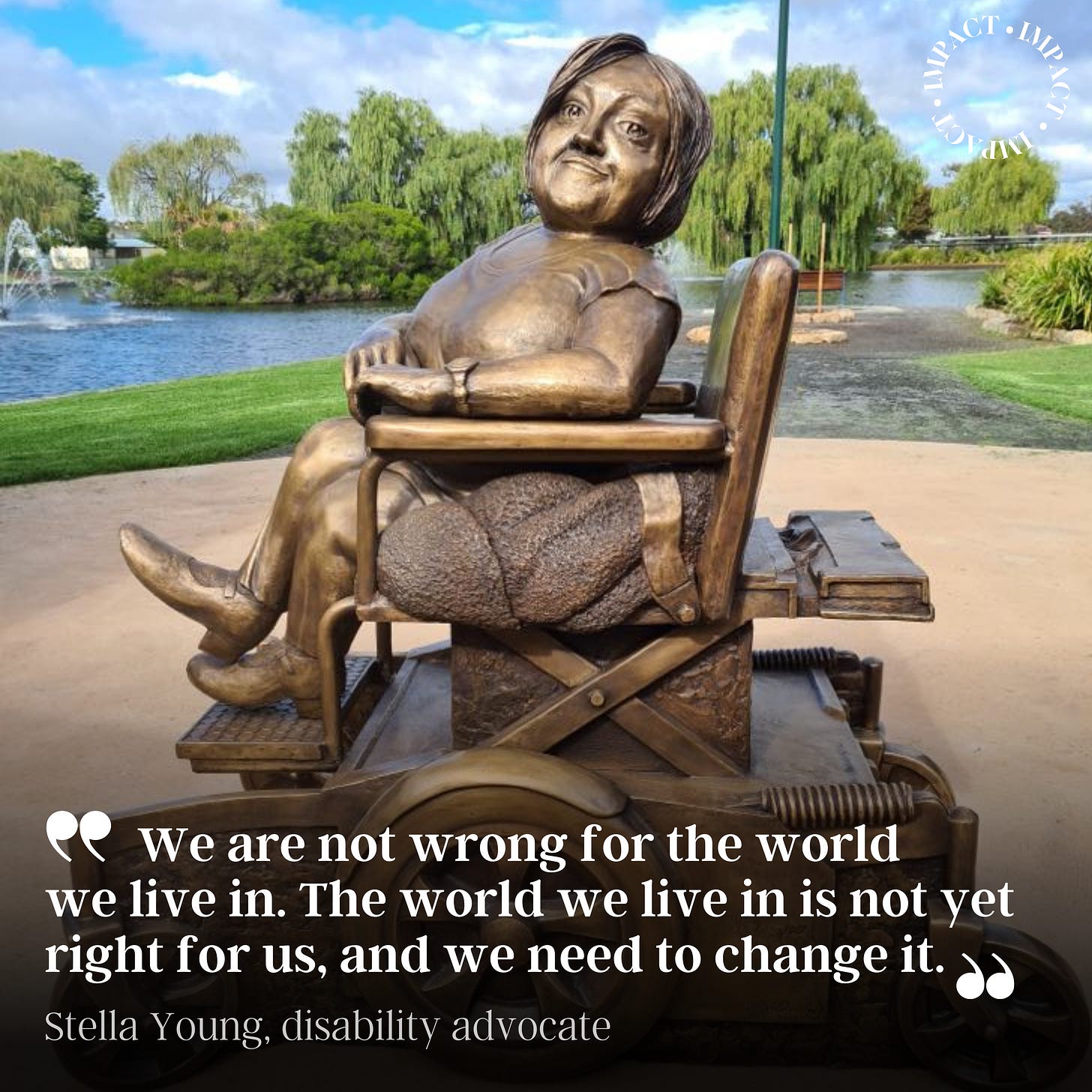The war on abortion pills
+ my friend, the “inspiration boner killer”
By Megan Clement
Only have a minute to read this newsletter? Here it is in brief:
- 💊 Why the abortion pill is the new frontier for anti-choicers.
- ✊ A new statue of my friend and favourite feminist.
- 📣 Tell us who influenced you to become a better feminist.
Read on for more. And if you want to be up-to-date on feminism worldwide, follow us on Twitter and Instagram.
Parlez-vous français ? Impact is also available in French:
Who’s afraid of the abortion pill?
Like Foucault’s pendulum, the hot air balloon, champagne and camembert, the abortion pill is among France’s greatest inventions. Mifepristone, one of two drugs taken as part of a medical abortion, was developed in the 1980s by the scientist and former member of the French Resistance, Étienne-Émile Baulieu.
Mifepristone is a synthetic steroid that works by blocking the hormone progesterone, which is essential for a pregnancy to develop. A second drug, misoprostol, then induces contractions to clear the uterus. The World Health Organization recommends making the pills available up to 12 weeks of pregnancy, though many countries do not follow this — in France, the limit was upgraded from just seven to nine weeks during the pandemic, when self-administered abortions became the default in many countries around the world due to lockdown measures.
Mifepristone and misoprostol are 95% effective and have a safety rate of more than 99%. The use of pills is the now most common form of abortion in the US and the UK (though systemic under-funding of abortion services in the UK means people often aren’t given a choice). The pills are on the World Health Organization’s list of essential medicines, though they are the only drugs to carry the disclaimer that they should be used “where permitted under national law and where culturally acceptable”.
Sadly, the places where mifepristone is considered acceptable are shrinking by the day. This month, a judge in Texas invalidated the drug’s approval by the Food and Drug Administration in a ruling that could see mifepristone banned throughout the country if it is upheld. An appeals court later ruled the drug could remain available pending the hearing of an appeal against the Texas decision, but blocked the pill from being sent by post.

It seems likely the issue will end up before the same Supreme Court that overturned Roe v Wade, the decision that established abortion rights in the US from 1973-2022. Elsewhere in Texas, a man is currently suing three women who allegedly helped his ex-wife obtain the drug last year.
Don’t think that the criminalisation of mifepristone is just a problem in the US. In Poland, activist and friend of the Impact newsletter, Justyna Wydrzyńska, was convicted of “helping with an abortion” and sentenced to eight months community service last month because she provided abortion pills to a woman who was experiencing domestic violence.
There is a reason anti-abortion fundamentalists want to stop people using this drug. Abortion medication takes the decision to end a pregnancy out of the hands of doctors and legislators and puts it squarely in the hands of people who need abortions. It is life-saving medication for people all over the world who live under abortion bans — it can be sent through the post so people can manage their own abortions at home, whether they live in Malta or Mississippi. As Baulieu told the New Yorker last year, “A method that makes the termination of pregnancy less physically traumatic for women and less risky to their health has always been rejected by pro-lifers: what they really seek is to harm and punish women.”
Using mifepristone to help someone with an abortion may be seen as a crime in some parts of the world, but it is nonetheless an extraordinary act of solidarity in a time of severe backlash against reproductive rights. From the Jane Collective, who organised abortions in the pre-Roe US, to the drones that dropped abortion medication into Poland and Northern Ireland in the 2010s, there have always been networks of people who help others end unwanted or unviable pregnancies — because abortions don’t stop when abortion is banned.
The people who risk being sued or prosecuted for helping people access the medication they need should be celebrated for doing what governments have failed to, not pursued in the courts.
What I learned from Stella Young
I was moved to tears by the recent news that my friend Stella Young, a trailblazing disability activist, comedian and feminist, has been honoured with a statue in her home town of Stawell in Australia. If there aren’t many statues of women around the world, there are certainly vanishingly few out there of women with disabilities.
I first met Stella when she came to the pub quiz I hosted, and in the years until her death at the age of 32 in 2014, I learned more from her about civil rights, persuasive writing, bold campaigning, intersectionality and activist joy than anyone else I’ve ever known. But with Stella, you never felt like you were being taught anything. You were usually just laughing as she berated bewildered bankers for snorting coke in the disabled toilets.

Stella was many things: hilarious stand-up comedian, brilliant dancer, accomplished editor, hair influencer, number one fan of a weird Melbourne indie band of which I am probably fan number two. Alongside it all, she was a tireless advocate for the rights of people with disabilities in “a world where disabled people, women in particular, are made to feel like we’re not really entitled to inhabit public spaces.”
She campaigned against the misogyny and ableism of a medical system in which women and girls are threatened with forced sterilisation or denied contraception simply because they have a disability. She wrote that “to live unapologetically in a body you’re consistently told you should be ashamed of is a political act.”
It is hard to write about how Stella inspired me to be a better feminist and a better person, because she is perhaps most famous for her TED talk, entitled I’m Not Your Inspiration, Thank You Very Much. On stage, she excoriated the idea that people with disabilities should be called “congratulated for getting out of bed and remembering our own names in the morning” or used as “inspiration porn” to make able-bodied people feel better about themselves. Yes, Stella was a self-described “inspiration boner killer”. But I can’t help it, I am inspired by her writing every time I sit down to work on this newsletter; I hope she’d forgive me for that.
During her life, Stella wrote a letter to both her 16-year-old self and her 80-year-old self. (She reassured teenage Stella: “You will have sex. A lot of sex. Relax.”) We’ll never meet 80-year-old Stella, but if I ever make it to that age, I’ll be a better person for having learned from her friendship, her politics and her conviction that “we are not wrong for the world we live in. The world we live in is not yet right for us, and we need to change it.”
Who in your life has inspired you to be a better feminist? Hit reply to this email to share your story.
Come see us in Perugia!
I will be moderating a panel on the state of gender journalism at the International Journalism Festival in Perugia on April 21st. The panel also features Impact contributor Agustina Ordoqui, who writes our monthly news wrap. Our panel is part of a series of discussions of diversity, equity and inclusion taking place at the festival. Come and say hi if you are there!